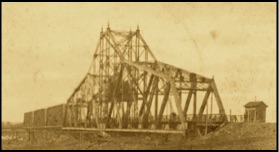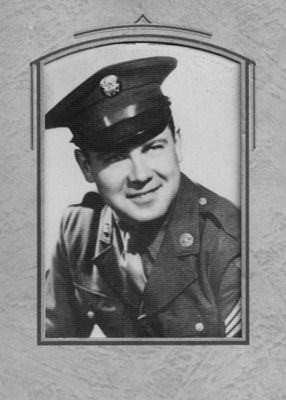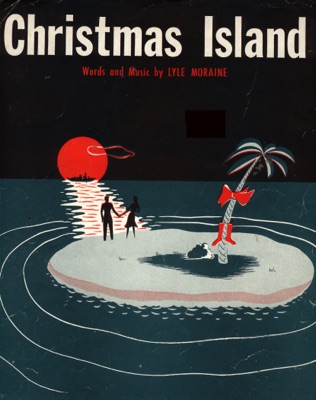Historical and Preservation Society of Pottawattamie County
County Seat Council Bluffs, Iowa



(Story by Richard Warner. Dr. Warner serves on the board of directors of the Historical and Preservation Society of Pottawattamie County.)
Christmas Island
The Andrews Sisters turned Christmas Island into the top ten in 1946. It has been recorded since by a variety of artists including Bob Dylan, Bing Crosby, and Jimmy Buffett.
Council Bluffs soldier Lyle Moraine used the chaplain's organ to write a song when homesick on board a ship during World War II on Christmas Eve.
Imagine it’s Christmas Eve. Instead of being in front of a Christmas tree at home surrounded by the warmth and laughter of family you are alone, cold, and maybe even a little scared. This is World War II and you are on a ship in the Pacific Ocean. There is one piece of land in sight, but it’s not a comfort tonight. It is almost as if it is mocking you with it’s name— it’s called “Christmas Island.”
The irony of not being home on Christmas Eve and being taunted by sight of a place who’s name won’t let you forget where you are and what night this is could make a man bitter-- or could provide an opportunity. Lyle Moraine chose the latter, borrowed the chaplain’s organ, and wrote a song that night… “How’d you like to spend Christmas on Christmas Island? How’d you like to spend the holiday away across the sea?”
“Christmas Island” has been recorded by Bob Dylan, Spike Jones, Bing Crosby, the Ventures, Ernest Tubb, Jackie Gleason, The Andrews Sisters, Guy Lombardo, Dickie Valentine, and the Lennon Sisters. The song hadn’t been recorded in a few years, then Jimmy Buffett chose it for the title track of his Christmas CD. It popped up again a few years ago in the movie Elf.
Lyle Moraine was born in Council Bluffs in 1914 and grew up on Fleming Avenue (now “Ivy Drive”) just off of North Broadway . After graduation from Abraham Lincoln High School in 1931 Lyle moved with his parents and sister to southern California. Jobs were scarce in Council Bluffs and the family felt there might be more opportunities in on the West Coast. Lyle found work in a rock quarry where he sustained a minor injury. He visited a doctor who commented that this young man had a handsome face; after all this is Southern California— had he considered auditioning for a movie? If he hadn’t thought of it before Lyle did then and went to the studios for a screen test.
The doctor was right; Lyle Moraine’s face did have a place on the screen. Though he never landed a leading roll he appeared in a host of movies over the next two decades. Appearances included the roll of a bellboy at the Palm Springs hotel in “Sing Me A Love Song” in 1937, a reporter in the Bette Davis / Humphrey Bogart movie “Marked Woman” also in 1937, a pilot in “Dive Bomber” in 1941, and the part of Lieutenant Poole in Abbot and Costello’s “Buck Privates” that same year. He was a policeman in “Call a Messenger", Henchman Pete in “Federal Bullets”, Harry Jills in “Midnight Court”, Granville in “Port of Missing Girls”, and the clipper engineer in “China Clipper”. Lyle appeared with Jane Wyman and William Hopper in “Public Wedding” and had parts in “Chicago Deadline”, “Ride, Kelly, Ride”, “Atlantic Flight”, “Melody for Two”, “Marked Woman”, “Her Husband’s Secretary”, “Touchdown, Army”, “Green Light”, “God’s Country and the Woman”, and “Fugitive in the Sky.” In 1975 Lyle was on the screen as a pianist in “Sheila Levine is Dead and Living in New York.”
Lyle’s build made him a perfect stand in for Bob Hope, a star he got to know well and spoke highly of. Lyle appeared himself in several Bob Hope movies including “My Favorite Spy” (1951) which also starred Hedy Lamarr and “Son of Paleface” (1952), a film that also featured one of Lyle's musical compositions. Hope knew he could count on Lyle, as well. When Hope decided to drive from the East back to California rather than take the train or fly it was Lyle he called to come and rescue him when he only made it was far west as St. Louis before deciding the long drive wasn’t such a great idea after all. The two were also frequent golfing partners. Lyle enjoyed a good relationship over the years with recording artist and actor Burl Ives as well, with whom he collaborated with on several songs. Ive’s recorded Lyle's “Tale of the Comet Kohoutek” in 1973 about what the media was then terming “the comet of the century” featured a powerful instrumentation and made its way to the playlist of many radio stations across the country, including Council Bluffs. The comet proved to be a dud, which unfortunately sent the song into obscurity as well.
Lyle was a frequent visitor back home and said despite his years in California he remained “a Council Bluffs boy through and through.” He never married, leaving no children to carry on his legacy, but instead leaving the world a little more enjoyable place thanks to his talents. Lyle Moraine died of natural causes in 1988 in California. He was 74.

